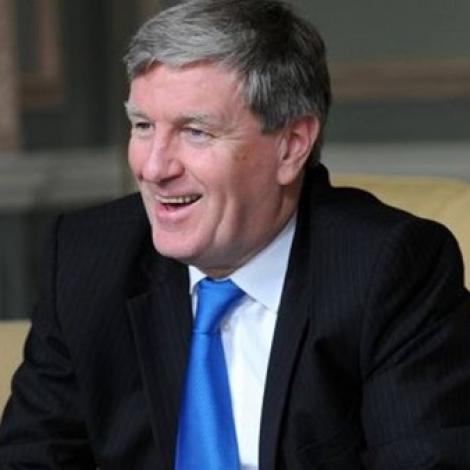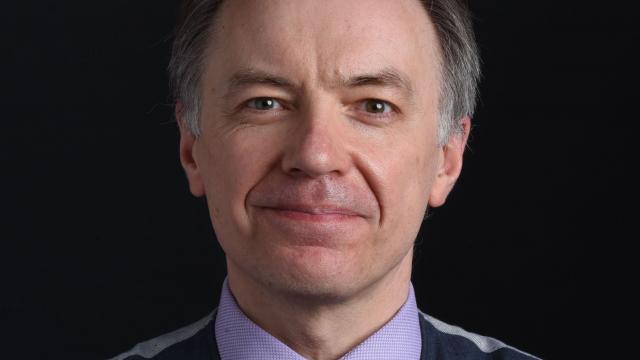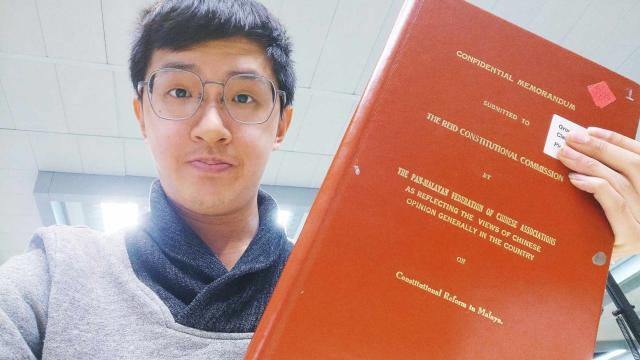
Ireland’s future multiverse: Northern Ireland, Britain, Europe, and America
Former Ambassador of Ireland and current Parnell Fellow, Daniel Mulhall, joined the IOI team to discuss the future of Ireland’s foreign policy with some of its closest partners. What might Sinn Féin’s foreign policy look like should they win the 2025 Irish election? How will Ireland respond if the EU establishes a full defence identity? Is Ireland the only remaining area in American politics where we can see bipartisanship? And we discuss how potential Irish reunification may affect the Republic’s foreign policy, including the possibility of joining NATO.
Scroll on to discover
- Executive summary
- About the speaker and discussant
- Watch the conversation
- What was said?
Executive summary
- Dan considered the potential paths Ireland’s foreign policy may follow with its four key external ‘constellations’: Northern Ireland, Great Britain, the European Union, and the USA. He considered all four to be experiencing turbulence and standing at a crossroads, at the same time that Ireland itself may be reaching an unprecedented moment in domestic politics as Sinn Féin could be in government for the first time in 2025, ending a century of a Fianna Fáil and Fine Gael duopoly.
- Regarding Northern Ireland, Dan thinks it likely that it will continue to ‘consume’ substantial portions of Irish diplomatic energies, noting its dominance at the recent Washington meeting of Biden and Varadkar. At present, Northern Ireland is unstable, with no-one quite happy with the status quo. It is unclear what will happen now that the DUP have voted against the Windsor Framework although the strong Westminster vote in its favour suggests a desire in London to move on from the Brexit imbroglio.
- With regard to Irish relations with Westminster, Dan argued that despite Rishi Sunak appearing to usher in a ‘return to normalcy’, the instinct for ‘Britain first’ policies remained. He suggested the need for a new joint institution or structure separate from the Good Friday Agreement to manage issues that inevitably arise between close neighbours. This would fill the gap in the relationship previously taken up by Ireland and the UK’s joint EU membership.
- On Ireland’s relationship with the EU, Dan focused particularly on defence policy, explaining that if the EU decides to push ahead and establish a ‘defence identity’, Ireland would have to have a difficult conversation about its long-held position of neutrality. Every other aspect of EU policy is very popular in Ireland, but that debate may be the ‘moment of truth’ for Ireland’s EU membership.
- Dan spoke about the unique partnership between Ireland and the United States, commenting that Ireland is one of the final remaining topics in American politics where one can see bipartisanship. Whilst the relationship is not one to be taken for granted, he sees it continuing far into the future, even if Irish America is itself evolving.
About the speaker
Dan Mulhall is a retired Irish diplomat, academic and published author. He is the current Parnell Fellow at Magdalene College, University of Cambridge and a consultant with the global law firm DLA Piper. He has also been Global Distinguished Professor of Irish Studies at Glucksman Ireland House, New York University.
During his diplomatic career, Mulhall served as Ireland’s Ambassador in Washington (2017-22), London (2013-17), Berlin (2009-13) and Kuala Lumpur (2001-05). He has held senior positions at the Department of Foreign Affairs, including as Director General for EU Affairs and Press Counsellor. In 1994-95, he was part of the Secretariat of the Forum for Peace and Reconciliation and was a member of the Irish Government’s delegation at the negotiations that culminated in the Good Friday Agreement of 1998. He is Honorary President of the Yeats Society (Sligo) and the author or co-editor of three books, the most recent being Ulysses: A Reader’s Odyssey (2022).
Watch the conversation
What was said?
After spending more than four decades in Ireland’s diplomatic service, former Ambassador of Ireland Daniel Mulhall, current Parnell Fellow in Irish Studies at Magdalene College, says he’s spending his retirement reflecting on the ‘broader picture’ of the geopolitical scene. Having held the positions of Ambassador to Germany, the UK, the USA, and also having been involved in the Good Friday Agreement negotiations, Dan is more aware than most of the dense and complex web of connections and relationships Ireland negotiates.
In his intervention, Dan set out the future paths Ireland’s foreign policy may take. All four of its major partners are facing internal uncertainty and turbulence. Ireland itself may be on the brink of significant political change should Sinn Féin take electoral victory in 2025, ending a century of governance from either Fianna Fáil or Fine Gael. In his opinion, a Sinn Féin government will feel obliged to push for an early referendum on Irish unity, thus complicating relationships with both unionists and London. He also noted Sinn Féin’s history of alliance with groups sceptical about the European project. The Occupied Territories Bill (which would ban trade with illegal settlements in Israel-occupied territories) may be pushed forwards in legislation, potentially causing tension with the USA.
Dan began with Northern Ireland, a region and relationship he foresees continuing to consume significant ‘external policy energies’ for Ireland’s diplomats and officials. He commented that in the recent Washington meeting between Biden and Varadkar, Northern Ireland was the number one issue in discussions. Dan argued that Northern Ireland itself doesn’t know what it wants, with most groups unhappy with the status quo and the DUP having announced it was voting against the Stormont Brake, and had continued concerns about the Windsor Framework as a whole. He thinks demographic and political shifts are at the root of the current uncertainty. Having a nationalist party as the largest party in Stormont has unsettled unionists. He advocated a new ‘compact’ between Northern Ireland’s political parties to put constitutional issues aside and commit to working towards improving Northern Ireland.
He is sceptical about reforming the Good Friday Agreement. It should not be reopened. For him, these sorts of agreements are products of their unique circumstances that pushed parties to finalise and sign them, and you cannot count on an agreement being reached again, especially in the current heated environment.
In Ireland’s relations with Britain, Dan thinks the ‘political delirium’ of Brexit has made Britain a ‘troubled neighbour’. Despite Sunak’s attempt to oversee a ‘return to normalcy’ in relations with the EU, Dan thinks the instinct for insularism and ‘Britain first’ policies remains. He argued that the newly announced Windsor Framework will likely resolve the fractious relationship between the UK and EU, but that inevitably normal neighbourly issues will arise in the future between the UK and Ireland. The solution to this, in Dan’s opinion, is a structure separate from the Good Friday Agreement that would allow British and Irish officials to meet and discuss the issues that connect the two islands.
We turned to the topic of the EU, and particularly the war in Ukraine, which Dan considers a ‘cross-roads’ moment for the Union. The Kremlin did not anticipate the EU standing together in the way they have, and Ireland itself has taken a strong position of opposition to Putin’s expansion. The ‘moment of truth’ in Irish membership of the EU will come, however, if and when the EU decides to have a serious attempt at developing its defence identity. Dan noted that every other aspect of EU policy is popular in Ireland but that defence was a tricky subject. He predicts that the EU will move forwards on defence if another ‘America first’ president takes office in the US as they wouldn’t be seen as a reliable partner for the EU. Whilst such a development would entail a ‘difficult conversation’ with the Irish electorate, Daniel thinks the conversation is necessary. The other pressing issue in EU relations is the continued debate on migration. Dan cautioned against thinking Ireland was immune to anti-immigrant sentiments, noting some recent manifestations in Ireland. These need to be ‘watched’.
Finally, Dan looked to America and the ‘remarkable set of relationships’ shared with Ireland considering that Ireland is not a NATO member and has some foreign policy instincts that are ‘at odds’ with those of the US. He thinks working together closely and successfully during Ireland’s Security Council term was beneficial for Ireland and demonstrated how it could be a useful partner. The US, like Ireland’s other partners, is also at a crossroads. The solid foreign policy consensus of the past is gone. Should a Trump-like presidency take power ‘all bets are up’ on US-EU relations given the ‘real hostility in that quarter’ to Europe. Even under Biden, there is an increasing ‘us versus them’ attitude to China and authoritarian states and a corresponding pressure for other states to pick sides.
Can Ireland continue to rely on Irish America for support? Dan was positive, arguing that America had had Ireland’s back for over a century. America’s support is a resource that Ireland will always ‘cultivate’, and isn’t one to take for granted. Later in the discussion, Barry Colfer asked how Irish America has evolved and what it might look like in the future. Dan stressed that Irish America is a population of over 30 million people, geographically dispersed, and therefore inevitably represents a range of views. He argued that Ireland is something that can still produce rare bipartisanship, recounting meeting a staunchly conservative Alabama Congressman who said ‘I disagree with the Democrats on anything, except Ireland’. The St Patrick’s Day lunch at Congress is a hugely unique event in the calendar – for two years Dan sat together with Nancy Pelosi and Donald Trump at the event. Whilst the world is moving on, and younger Irish Americans are developing a different relationship with Ireland from their elders, he thinks the relationship has enough ‘petrol in the tank’ to keep going for many years to come.
Questions from the audience raised the potential of Irish unification. What might this look like should the island unify? And how might a unionist voice impact foreign policy? Dan stressed that although he is in favour of unification, he isn’t pressing the accelerator on it. He thinks it is more important that the two parts of the island work together on common issues. Should the referendum process begin, he thinks there is a lot of persuasion to be done and isn’t sure that people are ‘well versed’ in the issues that will require work if reunification wereto become a realistic proposition. He also noted that it is difficult if unionists continue to dodge conversations about what they might want in a united Ireland. Whilst ‘everything should be on the table’ (including NATO and Commonwealth membership), there currently ‘is no table’ to even sit down at. Niamh Gallagher asked what role London should play in the process – Dan argued they had to be involved just as Dublin has a role. The Northern Ireland subsidy is a key issue and needs discussion on how it would be phased out over time. He also thinks London could have a role in suggesting how the British identity of unionists could be adequately reflected in future constitutional arrangements.
Overall, Dan thinks Ireland stands at a moment that looks more like ‘reboot’ than ‘refresh’; all parts of the ‘multiverse’ are undergoing upheaval at the same time. Ireland, however, has some ‘real assets’ that it hasn’t had before. During his career, the number of Irish missions has increased from 25 to 90, reflecting that Ireland is now a fully developed country which can contribute to the international environment, as well as benefitting from it. Whilst there are many issues that need addressing, Ireland is in a stronger position than forty years ago to address them.




